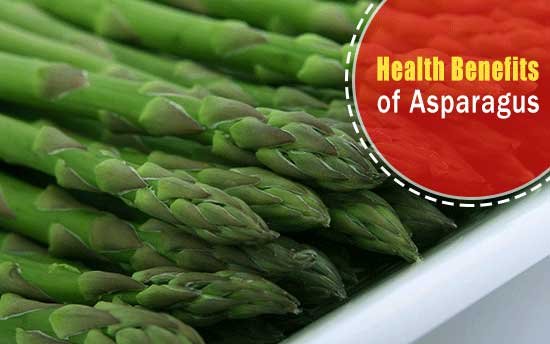
Asparagus, a kind of vegetable that usually is found on the market in the spring season.
There are 3 varieties of asparagus like purple, white, and green. All of the varieties are tasty and delicious to eat.
They are commonly served as an appetizer or side dish.
Steaming, Grilling, roasting, sautéing, and stir-frying are the cooking methods that people are regularly applied to eat asparagus.
Asparagus is not only tasty but also contains a great amount of nutritional value such as vitamin A, B1, B2, B3, B6, vitamin C, E, and vitamin K.
Moreover, it also has many minerals, for example, iron, folic acid, calcium, potassium, magnesium, amino acids, zinc, manganese, and phosphorus.
In addition, it is high in protein, carbohydrates, dietary fiber, and healthy fat.
Besides a high nutritional profile, asparagus contains a low amount of calories and sodium but has a high volume of water.
The antioxidant and anti-inflammatory properties make the asparagus special for getting different positive health benefits.
Dear viewers, today through this article, we will introduce you to some of the useful asparagus health benefits below-

Health Benefits of Asparagus:
Read More: Top 10 Health Benefits of Echinacea # Amazing Herb for Cold, Flu or a Cough!
-
Asparagus is Good for Digestion Problems:
Asparagus contains dietary and laxative fiber, which helps to transfer food into the stomach and keep your system working properly. This is a vital issue for decreasing constipation.
Moreover, this vegetable contains inulin. Prebiotic is digested only when it enters your large intestine.
Asparagus also helps in feeding the helpful bacteria available in the digestive system, improves your digestive health.
Asparagus has a high volume of water content that removes constipation and keeps your digestive area healthy.
However, you should eat asparagus reasonably because it may occur to stomach gas.
-
Asparagus Support Heart Health:
The powerful antioxidant and anti-inflammatory properties in asparagus can give you some benefits for your heart.
Vitamin B in the asparagus helps keep the good homocysteine levels that save your heart against severe heart diseases.
According to different studies, it is confirmed that if your homocysteine levels rise, you will be a higher possibility of having blood clots in your arteries and your veins as well as atherosclerosis.
To decrease the homocysteine levels, you should provide vitamin B6, B12, and folic acid in your body, which all exist in asparagus.
Vitamin K in asparagus can stop the arteries to be hardened and also keep calcium out of your arterial liners, keep your heart health in good condition.
Asparagus is regarded as a natural diuretic, which is very useful for a person with high blood pressure or different heart-related issues.
-
Benefits of Asparagus During Pregnancy:
One more health benefits of asparagus are to stop birth defects. Include asparagus in your diet, if you want to have a baby or during pregnancy.
The high amount of folate in asparagus is very much a necessary nutrient for women during pregnancy.
Folate helps in managing the nerve cell creations of the fetus and embryo. It also helps in making the fetal nerve cells that stop the condition of early births and also drops the possibility of getting an autistic child.
According to the study, taking folic acid content in asparagus help fetuses to drop by 79% of neural tube defects for pregnant women.
Additionally, the iron in asparagus also cares for the overall growth of babies.
Read More: Amazing Health Benefits of Alkaline Water: 13 Curable Diseases || No# 5 Is Exceptional!
-
Asparagus for Natural Diuretic:
Will you eat asparagus as a useful natural diuretic?
Definitely! Because asparagus may help the creation of urine to pass excess liquid and salt from your body quicker.
This flow will lessen the possibility of being infected in the urinary tract and other disorders related to it.
Eating asparagus benefits will help you in getting rid of the swelling and irritation of your body.
-
Asparagus Fight for Early Ageing:
People always are using beauty products to stop the premature aging process. But, eating asparagus is really helpful for stopping the early aging process.
This is why it contains a high amount of vitamin E, which is also called a lipid-soluble antioxidant that fights against the symptoms of early aging; for example, wrinkles, fine lines, and sagging skin.
Asparagus may even save tissues from the damage of free-radical and keep your skin healthy.
Antioxidant glutathione has the ability to stop the aging process. Pollution and Sun can raise the aging procedure, but glutathione will stop them from damaging your skin.
Moreover, you can eat asparagus to combat brain damage.
-
Asparagus Keeps Healthy Eyes:
Asparagus for healthy eyes is one of the top health benefits. Actually, this vegetable is rich in vitamin A content, which helps to absorb light from your retinas, process images, and then send them to your brain. It is required to keep your eyes in better condition.
Lack of vitamin A occurs the possibility of vision loss because of the weakness of your retina by age.
Additionally, asparagus also has carotenoid which is useful for your eye health. Carotenoids works as sunglass filters to stop the harmful Ultraviolet rays from damaging your eyes.
Actually, the benefits of asparagus play an important role to save against macular degeneration and cataracts over time.
-
Asparagus Controls Blood Sugar Level:
It is vital to control your blood sugar level in diabetes and asparagus is an outstanding vegetable to manage this condition.
Vitamin B in asparagus help to increase the creation of insulin level for helping the glucose absorption. As well as, it also has a great volume of chromium.
This is a kind of mineral that increases the carrying of glucose from the blood into cells.
-
Asparagus as Brain Booster:
Asparagus is also beneficial in fighting against the risk of brain failure. The higher source of folate and vitamin B12 in asparagus plays a vital role in keeping brain damage at bay.
A study conducted in Annals of Neurosciences in 2007 stated that the extract of asparagus has neuroprotective effects in humans and animals.
Regular eating of asparagus can help your brain to stop neurodegenerative problems, for example, Parkinson’s Huntington’s and Alzheimer’s disease.
-
Asparagus for Bones Health:
The higher source of vitamin K in asparagus will help you to manage the high bone density. Even it can help in restoring joints and bones damaged because of scratches. This will lessen the possibility of degenerative joint disease and osteoporosis.
According to a study published in 2001 by Nutrition said that vitamin K has the ability to control the bone metabolic process. Vitamin K has a positive effect in balancing calcium for the bone’s metabolic process.
One more study published in 2007, higher vitamin K content in asparagus can contribute to a positive effect of bones mineral density and lessen the possibility of fracture.
Moreover, the higher iron content in asparagus is also useful to maintain our bones and joints to be strong and flexible.
Also, the anti-inflammatory properties in asparagus help get rid of joint pain, commonly related to swelling.
-
Asparagus for Cancer Prevention:
The last health benefit of asparagus is to help stop cancer. For having its higher antioxidant content, it can destroy free radicals, drop the possibility of having various cancer types for example colon, breast, bone, lung, and larynx cancers.
Plus, it also has a great volume of glutathione, which is a cleansing compound that helps to get rid of poisons.
It is stated that the lack of glutathione may occur to oxidative stress, which is the main reason for many cancer types.







